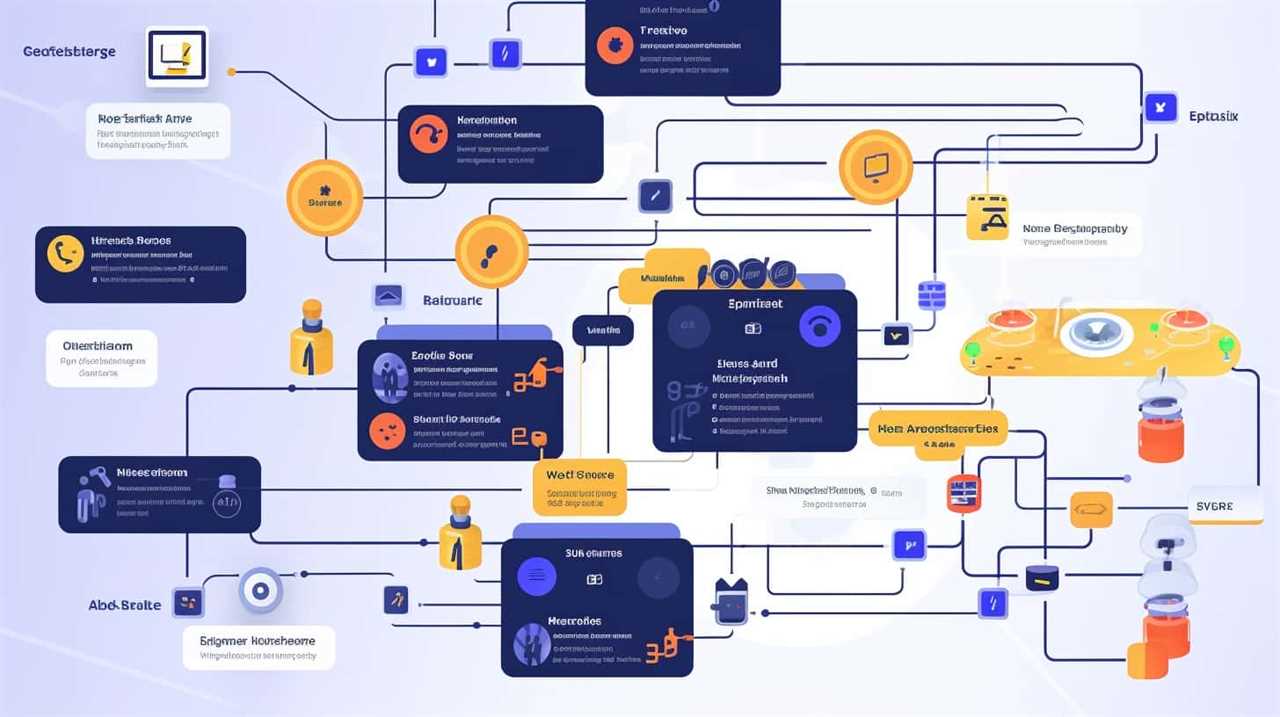Greetings to all you SEO enthusiasts out there!
In this article, we dive deep into the world of Google SEO terms.
Have you ever wondered about the importance of SEO and how it affects your website’s visibility?
We’ll explore on-page and off-page factors that contribute to your site’s ranking.

Plus, we’ll unravel common SEO terms that will empower you with the knowledge to master the art of optimizing your website for search engines.
So, let’s embark on this exciting journey together!
Key Takeaways
- SEO techniques involve activities such as keyword research, on-page optimization, link building, and content creation.
- Implementing effective Google SEO strategies can increase organic traffic and attract potential customers.
- Understanding common Google SEO terms is essential for optimizing website visibility and search engine rankings.
- Backlinks act as votes of confidence for website credibility and authority.
What Is SEO
SEO, or search engine optimization, is the process of improving a website’s visibility and ranking on search engine results pages through a combination of on-page and off-page techniques.
SEO techniques refer to the specific strategies used to optimize a website for search engines. These techniques involve various activities such as keyword research, on-page optimization, link building, and content creation.

By implementing effective SEO strategies, businesses can increase their organic traffic and attract more potential customers.
It’s important to stay up-to-date with the latest SEO trends and algorithms to ensure success in the ever-changing digital landscape.
A comprehensive understanding of SEO techniques and strategies is crucial for mastering the art of search engine optimization and achieving desirable results for a website.
Importance of Google SEO
Improving visibility and ranking on search engine results pages is crucial for businesses looking to attract more potential customers. Implementing effective Google SEO strategies offers numerous benefits, such as:

- Increased organic traffic: By optimizing your website for relevant keywords, you can drive more targeted traffic to your site, increasing the chances of converting visitors into customers.
- Improved user experience: Google SEO involves optimizing your website’s structure, design, and content, making it more user-friendly and easy to navigate.
- Enhanced brand credibility: Ranking higher on search engine results pages signals to users that your website is trustworthy and authoritative.
To measure the effectiveness of your Google SEO efforts, you can track key metrics like organic traffic, keyword rankings, and conversion rates. These insights help you identify areas for improvement and make data-driven decisions to optimize your SEO strategy.
Now, let’s delve into the next section and explore the crucial on-page SEO factors.
On-Page SEO Factors
We can optimize our website’s on-page elements to improve its visibility and ranking on search engine results pages. One crucial aspect of on-page SEO is keyword optimization. By strategically incorporating relevant keywords into our website’s content, we can signal to search engines what our website is about and increase our chances of appearing in relevant search queries. Another important on-page factor is the use of meta tags. Meta tags provide search engines with information about the content of our web pages, helping them understand and index our site more effectively. Below is a table highlighting the key on-page SEO factors:
| On-Page SEO Factors | Description |
|---|---|
| Keyword optimization | Incorporating relevant keywords in website content to improve search engine visibility. |
| Meta tags | Providing search engines with information about the content of web pages for better indexing. |
Off-Page SEO Factors
Moving beyond on-page optimization, let’s now delve into the realm of off-page SEO factors.

Off-page SEO refers to all the actions taken outside of your website to improve its search engine rankings.
Here are three key off-page SEO factors to consider:
- Link building strategies: Building high-quality backlinks from reputable websites can significantly boost your website’s authority and visibility. Focus on earning natural, relevant links through guest posting, influencer outreach, and creating valuable content that others will want to link to.
- Social media optimization: Social media platforms provide an excellent opportunity to increase your website’s exposure and drive traffic. Optimize your social media profiles, share your content, engage with your audience, and leverage social media advertising to reach a wider audience.
- Online reputation management: Building a positive online reputation is essential for SEO success. Monitor and respond to reviews, actively engage with your audience, and showcase your expertise to establish credibility and trust.
Common Google SEO Terms
Exploring common Google SEO terms helps us understand the key concepts and strategies for optimizing our website’s visibility and search engine rankings. Two important terms to familiarize ourselves with are keyword research and link building strategies.
Keyword research involves identifying the terms and phrases that users are searching for in relation to our website’s content. By incorporating these keywords into our website’s content, we can improve our chances of ranking higher in search engine results.

Link building strategies, on the other hand, focus on acquiring high-quality backlinks from other websites. These links act as votes of confidence for our website’s credibility and authority. By implementing effective link building strategies, we can increase our website’s visibility and improve our search engine rankings.
Let’s take a look at a table that summarizes these common Google SEO terms:
| Term | Definition |
|---|---|
| Keyword research | The process of identifying and targeting specific keywords for website optimization. |
| Link building strategies | Techniques used to acquire high-quality backlinks from other websites. |
Frequently Asked Questions
How Can I Improve My Website’s Loading Speed to Boost Its SEO Rankings?
To boost our website’s SEO rankings, we can improve its loading speed. A faster website not only enhances user experience but also has a positive impact on SEO. By optimizing images, minifying CSS and JavaScript, and using a content delivery network (CDN), we can significantly improve loading times.
Additionally, implementing website design trends and ensuring website security are crucial for SEO success. These factors combined will help us achieve higher rankings and attract more organic traffic.

Does Having a Mobile-Friendly Website Affect My Google SEO Rankings?
Having a mobile-friendly website has a significant impact on our Google SEO rankings.
It’s not just about making our site accessible on mobile devices; it’s about enhancing the user experience and driving higher conversion rates.
With the rise of mobile-first indexing, Google prioritizes mobile-friendly websites for better visibility and higher rankings.
Are Social Media Signals Considered as an Off-Page SEO Factor by Google?
Yes, social media signals are considered an off-page SEO factor by Google. When it comes to organic search rankings, social media engagement can have a significant impact.

The more engagement your content receives on social media platforms, such as likes, shares, and comments, the higher your chances of improving your organic search rankings.
Additionally, user-generated content plays a crucial role in off-page SEO. When users create and share content related to your website, it can enhance your online visibility and authority.
Is It Necessary to Regularly Update the Content on My Website for Better Seo?
Updating website content regularly is essential for better SEO. It helps improve search engine rankings, increase organic traffic, and engage visitors.
Fresh and relevant content signals to search engines that your website is active and provides up-to-date information. Regular updates also allow you to incorporate new keywords and optimize your content for better visibility.

Additionally, it encourages visitors to stay longer on your site, reducing bounce rates and improving user experience.
How Does Google Determine the Relevance and Quality of Backlinks for Off-Page Seo?
When it comes to determining backlink relevance and evaluating backlink quality, Google uses a variety of factors. These include:
- The authority and reputation of the linking website
- The relevance of the content surrounding the backlink
- The anchor text used
For example, if a reputable website in the same industry as ours links to our website with a relevant anchor text, Google is more likely to consider it a high-quality and relevant backlink.
Conclusion
In conclusion, mastering Google SEO is essential for any website owner looking to increase their online visibility and attract organic traffic.

By implementing on-page and off-page SEO factors, you can improve your website’s ranking on Google search results.
Remember, SEO isn’t a one-time task but an ongoing process that requires continuous optimization.
So, don’t be a digital dinosaur – stay on top of the latest Google SEO trends to ensure your website stays relevant and competitive in the ever-evolving online landscape.









